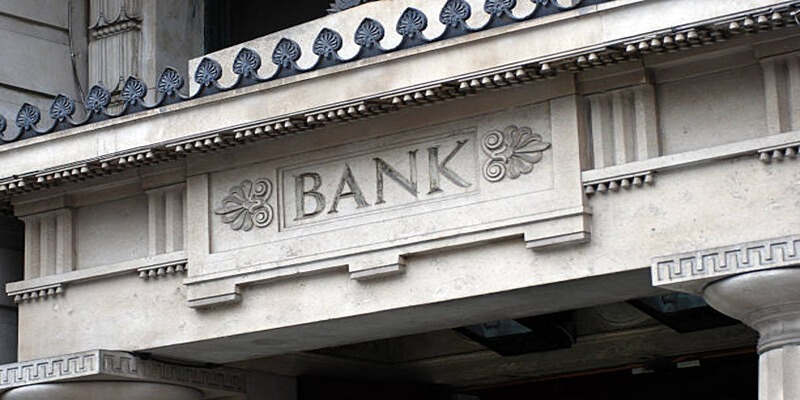Understanding the Functionality and Importance of Commercial Banks
Sep 08, 2024 By Georgia Vincent
Commercial banks are crucial to the modern economy, serving as intermediaries between savers and borrowers. They enable financial transactions, deliver essential banking services, and offer a secure environment for individuals and businesses to manage their finances. By accepting deposits and extending loans, commercial banks stimulate economic growth, encourage investments, and support entrepreneurship. Additionally, they provide a range of financial products, such as savings accounts, mortgages, and credit lines, designed to address the varied needs of their customers. Understanding the role and significance of commercial banks not only emphasizes their contribution to financial stability but also highlights their impact on a nation's overall economic health.
Role of Commercial Banks in the Economy

Commercial banks serve as the backbone of the financial system by facilitating the flow of capital and ensuring liquidity in the economy. They perform essential functions such as accepting deposits from the public, which not only provides a safe haven for individuals' savings but also allows banks to pool resources for lending. Through the provision of loans, commercial banks enable businesses to expand, invest in new projects, and create jobs, thereby driving economic development.
Additionally, these banks play a critical role in setting interest rates, which influence consumer spending and investment decisions. By providing financial literacy resources and advising clients, commercial banks further empower individuals and businesses to make informed financial choices. Ultimately, the dynamic relationship between commercial banks and the economy fosters stability and growth, shaping the economic landscape for future generations.
Types of Services Offered
Commercial banks offer a diverse array of services designed to cater to the financial needs of individuals and businesses. These services not only facilitate everyday transactions but also support long-term financial planning and investment strategies.
Savings Accounts
Savings accounts are designed to encourage individuals to save money while earning interest on their deposits. These accounts typically offer lower interest rates compared to other investment options but provide high liquidity, ensuring that funds are readily accessible in case of emergencies or immediate needs.
Checking Accounts
Checking accounts allow customers to deposit and withdraw money conveniently, making them ideal for managing day-to-day expenses. They often come with features such as debit cards, online banking, and overdraft protection, providing ease of access and flexible management of funds.
Loans and Mortgages
Commercial banks provide various types of loans, including personal loans, auto loans, and mortgages. Mortgages, specifically aimed at helping individuals purchase homes, typically feature lower interest rates and longer repayment terms. By assessing creditworthiness, banks determine eligibility and loan amounts, aiding customers in achieving significant financial milestones, such as homeownership.
Credit and Debit Cards
Credit and debit cards offer consumers a convenient way to make purchases without cash. Credit cards provide a line of credit that requires repayment, typically with interest, while debit cards draw directly from the user's checking account. Both options include additional features such as rewards programs, allowing users to earn points or cashback on their spending.
Investment Services
Many commercial banks offer investment services, including wealth management, retirement planning, and brokerage services. Through these services, banks provide expert guidance on investment portfolios, help customers strategize for long-term financial growth, and facilitate access to stock markets or mutual funds. These offerings empower clients to optimize their financial health and achieve their investment goals.
Financial Advisory Services
Commercial banks often employ financial advisors who assist customers in making informed financial decisions. These advisors can provide insights into budgeting, saving for retirement, or managing debt, tailored to each client's unique circumstances. By offering personalized advisory services, commercial banks help individuals and businesses navigate complex financial landscapes.
Regulatory Framework and Compliance

The regulatory framework surrounding commercial banks is essential for maintaining the stability and integrity of the financial system. Regulatory bodies, such as the Federal Reserve in the United States, implement guidelines that banks must adhere to, encompassing capital requirements, risk management practices, and consumer protection laws. Compliance with these regulations ensures that banks operate in a safe and sound manner, safeguarding depositors' interests and promoting trust in the financial system. Regular audits and examinations by regulatory agencies help ensure banks meet these standards and address any potential vulnerabilities.
Additionally, laws such as the Dodd-Frank Act serve to enhance transparency and accountability, minimizing the likelihood of financial crises. By adhering to regulatory mandates, commercial banks play a pivotal role in fostering a resilient economic environment.
The Future of Commercial Banking
As the financial landscape evolves, commercial banking must adapt to emerging technologies and changing consumer preferences. The following trends illustrate the future direction of commercial banking:
Digital Transformation
The shift towards digital banking services is revolutionizing how consumers interact with their banks. With an increasing reliance on mobile apps and online platforms, banks are investing in technology to provide seamless user experiences. This transformation includes improved security features, faster transaction processing, and personalized financial insights through AI and data analytics, making banking more accessible than ever.
Fintech Collaboration
Commercial banks are increasingly partnering with fintech companies to enhance their service offerings and stay competitive. These collaborations allow traditional banks to leverage innovative technologies, such as automated financial advice, to improve efficiency and customer satisfaction. By embracing the fintech ecosystem, banks can offer advanced solutions and streamline operations, ultimately benefiting their client base.
Sustainability Initiatives
Environmental sustainability is becoming a significant focus for commercial banks. Many institutions are implementing policies that promote responsible lending practices and support green investments, such as renewable energy projects. By aligning their business models with sustainability goals, banks not only contribute to a healthier planet but also attract socially conscious consumers and investors.
Enhanced Security Measures
As digital banking grows, so does the risk of cyber threats. Commercial banks are investing in robust cybersecurity systems to protect customer data and maintain trust. This includes multi-factor authentication, encryption technologies, and continuous monitoring of suspicious activities. By prioritizing security, banks aim to safeguard vital assets while ensuring compliance with regulatory standards.
Conclusion
Commercial banking is a vital component of the financial system, providing essential services such as deposits, loans, and investment opportunities. As weve explored, the regulatory framework ensures stability and consumer protection, while the future trends of digital transformation, fintech collaboration, sustainability, and enhanced security measures highlight the ongoing evolution within the industry. By adapting to these changes, commercial banks not only enhance their service offerings but also contribute to broader economic growth and resilience, ultimately fostering trust and security for their clients. This dynamic nature of banking promises continued advancement as financial needs evolve.

Safeguarding Your Savings: Strategies to Protect Purchasing Power
Sep 22, 2024
Explore effective investment strategies to safeguard your savings from inflation and create a diversified portfolio that aligns with your financial goals.

Understanding the Difference: Money Market Accounts vs. Money Market Funds
Sep 08, 2024
Explore the differences between Money Market Accounts and Funds, helping you choose the right option for your financial goals and risk tolerance.

An Eccentric Guide: What Is Bank Capital?
Jan 08, 2024
A bank's net worth is calculated by subtracting its liabilities from its assets. Primarily, it safeguards the bank's creditors in the event of liquidation by acting as a reserve against unforeseen losses. The bank's holdings are liquid funds, safe government securities, and interest-bearing loans from other financial institutions.

Understanding Service Charge Definition, Types, and Why It's Not a Tip
Oct 18, 2023
Are you looking for the scoop on service charges? Discover types and why they're not tips in this concise guide!

Credit Cards With Chip and PIN: A User's Guide
Jan 08, 2024
When using a chip-and-PIN card, the cardholder must input their identification number to approve the transaction (PIN). With chip-and-PIN cards, the transactional data is stored on a square microchip instead of the prior magnetic stripe-based technology used by most credit cards. As a result, fraudsters will have a more challenging time accessing your funds with chip-and-pin cards.

How an Auto Loan Grace Period Can Save You From Late Fees?
Jan 21, 2024
Learn about Auto loan grace periods and how to use them wisely. Get all the information you need to stay on top of your car loan payments.

How To Determine Your Net Worth and Its Significance
Feb 13, 2024
An individual's or a company's "net worth" is the total of their assets less their liabilities. A person's net worth is a criterion used by the financial services sector in deciding whether or not to offer them access to specific investment strategies or to sell them specific financial goods.

A complete Delta Reserve Credit Card Review
Dec 08, 2023
The Delta Reserve Card is a high-end co-branded credit card offered by Delta Air Lines. However, it is not the best credit card to use for day-to-day purchases since it grants access to the Delta Sky Club for passengers traveling on Delta and also the A.E Centurion Lounges for those passengers flying on other airlines. Anybody who isn't a diehard Delta supporter should seek elsewhere.

Secure 2.0: Enabling Employees to Invest in Their Future Needs
Aug 30, 2024
Explore Secure 2.0's impact on retirement planning, emphasizing financial literacy, flexible savings, and sustainable investment options for employees.

DCU Visa Platinum Secured Credit Card Review for 2023
Oct 15, 2023
Yes, it is if you are looking for an easy and secure way to build your credit score. While it may not have cashback, it has many other benefits. Read more to see.

How Do I Make a Yield Curve in Excel?
Nov 20, 2023
Bond interest rates over varying maturities are plotted on yield curves. It's not uncommon for contracts to last anywhere between two months and twenty years. A bond's yield may be compared to its yield at maturity using a yield curve. Your yield curve might be steep, flat, humped, or inverted based on your provided information, even though a typical yield curve rises as maturity increases.

Most Effective Credit Unions For Business Accounts
Jan 01, 2024
In the United States, credit unions include more than 100 million members. Financially, they provide many of the same options to companies as more conventional banks. A credit union may provide you with a business account, loans, and other services to help your company succeed, such as guidance on expanding your operations. Credit unions, however, differ from banks in important ways.